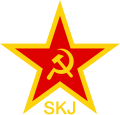8th Auditing Commission | |
|---|---|
  Emblem of the League of Communists of Yugoslavia | |
| 13 December 1964 – 11 March 1969 (4 years, 88 days) Overview | |
| Type | Auditing organ |
| Election | 8th Congress |
| Members | |
| Total | 15 members |
| Newcomers | 15 members (8th) |
| Reelected | 1 (9th) |
This electoral term of the Auditing Commission was elected by the 8th Congress of the League of Communists of Yugoslavia in 1964, and was in session until the convocation of the 9th Congress in 1969.
